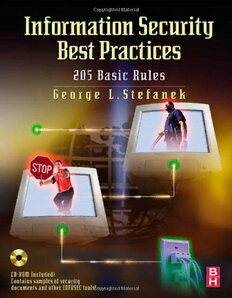Download Information Security Best Practices: 205 Basic Rules PDF Free - Full Version
Download Information Security Best Practices: 205 Basic Rules by George L. Stefanek in PDF format completely FREE. No registration required, no payment needed. Get instant access to this valuable resource on PDFdrive.to!
About Information Security Best Practices: 205 Basic Rules
Protecting computer networks and their client computers against willful (or accidental) attacks is a growing concern for organizations and their information technology managers. This book draws upon the author's years of experience in computer security to describe a set of over 200 "rules" designed to enhance the security of a computer network (and its data) and to allow quick detection of an attack and development of effective defensive responses to attacks. Both novice and experienced network administrators will find this book an essential part of their professional "tool kit." It is also essential reading for a corporate or organization manager who needs a solid understanding of the issues involved in computer security.Much literature is available on network and data security that describes security concepts, but offers so many different solutions to information security problems that it typically overwhelms both the novice and the experienced network administrator. This book presents a simple set of rules important in maintaining good information security. These rules or best practices are intended to be a recipe for setting up network and information security. This manual will take the mystery out of configuring an information security solution and provide a framework which the novice as well as experienced network administrator can follow and adapt to their network and data environment. * Provides practical, "battle tested" rules and guidelines to protect computer networks against different forms of attack* Covers both network and client level attacks, including attacks via the internet and damage to the physical hardware of a network* Accompanying CD includes an electronic version of the book
Detailed Information
| Author: | George L. Stefanek |
|---|---|
| Publication Year: | 2002 |
| ISBN: | 9780585449975 |
| Pages: | 207 |
| Language: | English |
| File Size: | 1.688 |
| Format: | |
| Price: | FREE |
Safe & Secure Download - No registration required
Why Choose PDFdrive for Your Free Information Security Best Practices: 205 Basic Rules Download?
- 100% Free: No hidden fees or subscriptions required for one book every day.
- No Registration: Immediate access is available without creating accounts for one book every day.
- Safe and Secure: Clean downloads without malware or viruses
- Multiple Formats: PDF, MOBI, Mpub,... optimized for all devices
- Educational Resource: Supporting knowledge sharing and learning
Frequently Asked Questions
Is it really free to download Information Security Best Practices: 205 Basic Rules PDF?
Yes, on https://PDFdrive.to you can download Information Security Best Practices: 205 Basic Rules by George L. Stefanek completely free. We don't require any payment, subscription, or registration to access this PDF file. For 3 books every day.
How can I read Information Security Best Practices: 205 Basic Rules on my mobile device?
After downloading Information Security Best Practices: 205 Basic Rules PDF, you can open it with any PDF reader app on your phone or tablet. We recommend using Adobe Acrobat Reader, Apple Books, or Google Play Books for the best reading experience.
Is this the full version of Information Security Best Practices: 205 Basic Rules?
Yes, this is the complete PDF version of Information Security Best Practices: 205 Basic Rules by George L. Stefanek. You will be able to read the entire content as in the printed version without missing any pages.
Is it legal to download Information Security Best Practices: 205 Basic Rules PDF for free?
https://PDFdrive.to provides links to free educational resources available online. We do not store any files on our servers. Please be aware of copyright laws in your country before downloading.
The materials shared are intended for research, educational, and personal use in accordance with fair use principles.

